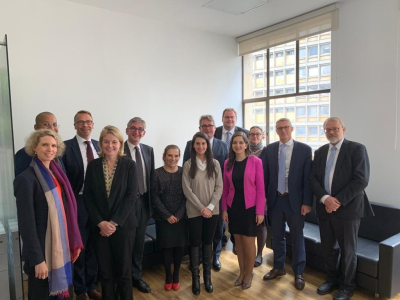About
The EFTA States signed a Free Trade Agreement with Colombia in Geneva, Switzerland, on 25 November 2008. The Agreement entered into force on 1 July 2011 for Colombia, Liechtenstein and Switzerland, 1 September 2014 for Norway and 1 October 2014 for Iceland.
Key facts
- Population
51,874,020
- GDP
$ 343,622.11 M
- Date of Signature of the Agreement
25.11.2008
- Date of Entry Into Force
01.07.2011
- Imports to EFTA States
EUR 662 M
- Exports from EFTA States
EUR 609 M
Information about agreement
Summary
The main focus of the EFTA-Colombia Free Trade Agreement is the liberalisation of trade in goods. Additional agricultural agreements between the individual EFTA States and Colombia form an integral part of the instruments establishing a free trade area.
Content of the Free Trade Agreement
The Agreement consists of 13 Chapters, 145 Articles and 20 Annexes. The Agreement covers the following main subjects:
- Trade in Goods
- Rules of Origin
- Trade Facilitation
- Sanitary and Phytosanitary Measures (SPS)
- Technical Barriers to Trade (TBT)
- Trade Remedies
- Trade in Services
- Investment/Establishment
- Protection of Intellectual Property (IPR)
- Government Procurement
- Competition
- Institutional Provisions
- Dispute Settlement
Trade in Goods
Industrial Goods and Fish and marine products
Most industrial goods, including fish and other marine products, will benefit from duty-free access to the respective markets of the EFTA States as of the entry into force of the Agreement. For products imported into Colombia, most customs duties are eliminated after transitional periods of up to 9 years. This asymmetrical treatment reflects differences in the economic development of the Parties.
Agricultural products
The Agreement provides for tariff concessions on processed agricultural products. Tariff concessions on selected basic agricultural products are covered by the bilateral agricultural agreements, which are part of the instruments establishing a free trade area between the Parties.
Rules of Origin
The Agreement provides for liberal rules of origin found in Annex V and its Appendices.
Trade Facilitation
Detailed provisions on trade facilitation are found in Annex VII.
Sanitary and Phytosanitary Measures (SPS)
The Agreement includes provisions sanitary and phytosanitary measures in conformity with the relevant WTO Agreements.
Technical Barriers to Trade (TBT)
The Agreement includes provisions on technical regulations and subsidies, in conformity with the relevant WTO Agreements.
Trade Remedies
Provisions on trade remedies are found in Chapter 2, and refer to WTO law.
Trade in Services
The Chapter on trade in services (Chapter 4) closely follows the WTO General Agreement on Trade in Services (GATS) approach. It covers all four modes of supply of a service, as defined under the GATS, and addresses all services sectors. The Chapter on trade in services deals with general disciplines, whereas more specific provisions for certain sectors are contained in Annexes (financial services, Annex XVI; telecommunication services, Annex XVII).
The lists of specific commitments of each Party are covered in Annex XV. These lists will be reviewed every three years with the objective to further liberalise trade in services between both sides.
Investment/Establishment
The Chapter on investment (Chapter 5) aims to improve the legal framework conditions for EFTA and Colombian businesses investing in each other’s markets, in particular by granting non-discriminatory rights of establishment and operation (commercial presence) in economic sectors that are not covered by the Chapter on trade in services.
For a few areas, the Parties have lodged reservations to national treatment based on restrictions in their national legislation (Annex XVIII). The investment provisions in the Agreement complement the Investment Protection Treaties that may be concluded bilaterally between individual EFTA States and Colombia.
Protection of Intellectual Property (IPR)
The Agreement contains a full-fledged chapter on intellectual property rights (IPR; Chapter 6), covering all fields of IPR as well as measures relating to enforcement. The Chapter is based on the WTO Agreement on Trade-Related Aspects of Intellectual Property Rights (TRIPS), but includes certain improvements and clarifications with respect to TRIPS. For the first time in an EFTA Free Trade Agreement, measures relating to biodiversity are included.
Government Procurement
Through the Agreement, the Parties consent to mutually open their government procurement markets. The government entities covered are listed in Annex XIX, while further provisions are contained in Annex XX (General Notes).
The Chapter on government procurement (Chapter 7) deals with the procedures to be followed by a government entity which is procuring goods, services and construction services above a certain threshold (specified in Annex XIX). The Chapter draws inspiration from the WTO Agreement on government procurement, but is adapted in a way to reflect the interests of the Parties.
Competition
Parties recognise that anti-competitive business practices have the potential to undermine the benefits of liberalisation arising from the Agreement. Accordingly, each Party commits to applying its competition legal framework with a view to avoiding such practices. The Parties also agree to co-operate on issues relating to competition law enforcement.
Institutional Provisions
A Joint Committee is established which supervises and administers the Agreement and oversees the further development of the Agreement. The Joint Committee may take decisions in cases provided for by the Agreement and make recommendations in other matters.
Dispute Settlement
The Chapter on Dispute Settlement (Chapter 12) contains rules and procedures for the settlement of disputes arising from the Agreement between one or more EFTA States and Colombia.
Free Trade Agreement
Annexes and Record of Understanding
Annexes and Record of Understanding - English
Anexos - Español
PAPs notifications
Joint Committee Decisions
| Decision | Subject | Adopted | Entry into force | |
|---|---|---|---|---|
| 2014 | ||||
| No. 1/2014 | Rules of Procedure of the Joint Committee | 07.11.2014 | 07.11.2014 | |
| No. 2/2014 | Rules of Procedure for the Arbitration Panel | 07.11.2014 | 07.11.2014 | |
Joint Declaration on Cooperation
Statistics
For EFTA-Colombia trade statistics, see EFTA Trade Statistics Tool


